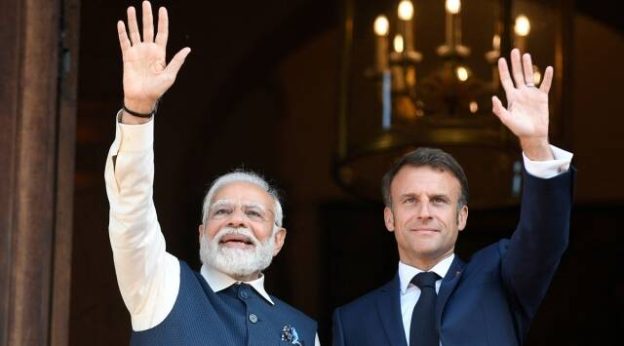As a pioneer in recognizing DPIs’ significance, India highlights this globally through its G20 and Shanghai Cooperation Organisation (SCO) presidencies.
Recently, during Prime Minister Narendra Modi’s state visit to France, India announced that its real-time online payments system– Unique Payments Interface (UPI) will soon be operational in France, making it the first European country to accept UPI. There are reports that other European countries such as BENELUX (Belgium, The Netherlands, and Luxembourg) and Switzerland are expected to follow France in recognizing UPI. If expanded further, this move is not only expected to benefit thousands of Indian tourists visiting various destinations across Europe but also open doors for India’s Digital Public Infrastructure (DPI) systems, of which UPI is a major component, in Europe.
India’s leadership in DPI is evident through its open and accessible platforms, enabling digital identification, real-time online payments, and data exchange for essential services, fostering digital inclusion. India Stack, with its unified digital components and APIs, has facilitated a remarkable leap into digital transformation, exemplified by Aadhar, UPI, and CoWin initiatives, implemented at a population scale.
As a pioneer in recognizing DPIs’ significance, India highlights this globally through its G20 and Shanghai Cooperation Organisation (SCO) presidencies. The SCO adopted India’s DPI framework proposal, showcasing its global potential. Though the G7 views India’s DPI cautiously due to its data governance implications and potential competition of Indian DPI models against Western payment processors like Visa and Mastercard, there is considerable promise and benefits in deepening India-EU cooperation in DPIs.
India and the EU have been cooperating on digital technologies for a long time, however, DPI only became a component of mutual interest lately. During the first EU-India Trade and Technology Council (TTC) Meeting held in May 2023, India and the EU agreed for the first time to find ways to enhance the interoperability of DPIs amongst themselves. There are various reasons why India-EU cooperation on DPIs is advantageous.
First, India and the EU share similar digital transformation goals where DPIs secure a dominant position. Whether it is the EU’s Digital Identity or Open Banking and India’s Aadhar, UPI, DigiLocker, or Open Credit Enablement Network (OCEM), both envision contemporary DPI models for enhancing public delivery and digital inclusion, inspired by the democratic virtues of making the digital world open, free, and accessible to all. This makes both EU and India natural partners in DPIs as well as leverage and comprehend each other’s interests and competencies better, especially in multilateral forums such as the G20 or the UN where India has been pitching for the global recognition of DPIs.
Second, the EU offers India an optimal entry into the developed world for its DPI capabilities. India has showcased DPI prowess in the global south, but not in developed regions. With successful large-scale DPI implementations, India can demonstrate digital public goods to the EUmarket, leveraging its experience. While the EU is a complex market, India can extend sustainable, cost-effective digital solutions to other developed nations, enhancing its global DPI leadership and credibility.
Third, enhanced DPI cooperation between India and the EU promotes mutual understanding and best practice exchange in data governance and security. India excels in DPI, while the EU leads in data governance, exemplified by GDPR. India’s Data Protection Bill also echoes key GDPR principles like consent and data fiduciary, while emphasizing user empowerment through DEPA – part of India Stack. By leveraging strengths, India and the EU can establish shared data governance standards for trusted cross-border data flows, safeguarding data protection and empowerment.
India’s engagement with the EU has been a subject of considerable interest, we believe India should consider reaching out to individual EU countries rather than a ‘one-size fits all’ approach. The 27 members of the EU possess unique domestic policies and specific needs that require targeted attention from India. UPI may provide a head start in Europe, but to diversify its impact India should also market other cost-effective and efficient DPI solutions such as Modular Open Source Identity Platform (MOSIP), OCEM and Open Network for Digital Commerce (ONDC). By catering to these needs and aspirations, India can establish trust and legitimacy for its developmental model on the global stage.
India-EU DPI cooperation can utilize established channels like TTC and Information Technology (IT) Working Group for enhanced engagement. Streamlined bilateral interactions would share best practices in data governance standards and DPI interoperability, while also fostering stakeholder engagement and exploring joint funding for innovative DPI solutions. Alternatively, India should also establish a dedicated institution that facilitates collaboration in DPI to effectively promote its digital transformation goals to the rest of the world. This institution should comprise a team of experts from government and industry who should work to streamline the process of integrating India’s DPI approach into other countries’ frameworks.
The forthcoming India-EU summit should prioritize DPIs as a major focus area, distinct from the recent summits in 2020 and 2021 where digital transformation was only discussed in general. To bolster the strategic partnership, this summit should strongly emphasize DPIs, identify target sectors, and suggest inventive ways to amplify bilateral cooperation in this domain. This will foster a potent India-EU DPI alliance and contribute to the development of a globally consequential digital partnership.
https://www.financialexpress.com/business/defence-france-opens-doors-to-indias-dpi-outreach-in-europe-3214913/





